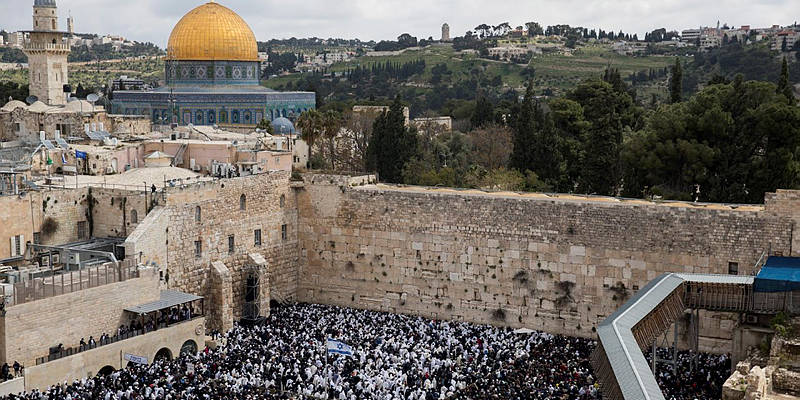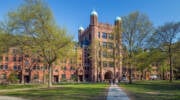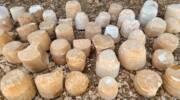While it is common to speak of 20 centuries of Jewish exile, the truth is that Jews never did completely leave Israel.
By Jacob Sivak, The Algemeiner
In a Tablet Magazine article, Ryan Bellerose asked, “Are Jews Indigenous to the Land of Israel?”
Bellerose’s answer is yes. He refers to Jews as occupying ancestral lands, having a common ancestry, a common culture (including religion), and a common language. Bellerose writes that while “Palestinian Arabs also hold a claim to the land of Israel … this does not trump the indigenous status of Jewish people.”
Indigeneity is not dependent on whether the group in question is dominant in its ancestral homeland. While it is common to speak of 20 centuries of Jewish exile, the truth is that Jews never did completely leave Israel.
This is made clear from reading a superbly illustrated volume edited by Dan Bahat, an Israeli archaeologist known for excavating the Western Wall tunnels. The book, Twenty Centuries of Jewish Life in the Holy Land — The Forgotten Generations was published in the 1970s.
In fact, until at least the fifth century of the Common Era, Jews constituted a significant portion, if not a majority, of the population in Israel, particularly in Galilee. It was a period of considerable Jewish autonomy and literary activity, highlighted by the existence of the Sanhedrin and the writing of the Jerusalem Talmud. The existence of a significant Jewish population was recorded by the Christian historian Eusebius, and the evidence is clear from the extensive archaeological sites visible today, such as those at Beit Shearim and Tzippori, as well as the numerous and widespread synagogue ruins and mosaics that have been uncovered.
Jewish autonomy and numbers in Palestine diminished once Christianity became the dominant religion of the Roman Empire. During Byzantine rule in the fifth century, a majority of the population was Christian; Jews were unable to hold public office and Jewish access to Jerusalem was restricted.
With the Arab conquest in the seventh century, the lives of the Jews in Israel improved marginally. Jews were periodically permitted to live in Jerusalem, and documents from the Cairo Genizah indicate that Jews continued to populate a number of communities. Moreover, records show that Jews played an important role, alongside Muslims, in battling the Crusaders in the 11th and 12th centuries, particularly in the defense of Jerusalem and Haifa. The Spanish-Jewish traveler Benjamin of Tudela recorded that Jews continued to inhabit a number of towns, including Jerusalem, during Crusader rule.
The defeat of the Crusaders by Saladin meant a return to Muslim domination, a condition which persisted until the defeat of the Ottoman Turks by British forces in 1917. During this long period, the size of the Jewish population varied because of immigration and natural disasters.
For example, in 1211, 300 rabbis from France and England made aliyah, settling mainly in Acre and Jerusalem. The expulsion of Jews from Spain and Portugal in the late 15th century led to a migration to the Ottoman Empire, including Palestine. Safed (Tzfat) and its surroundings became the largest Jewish community in the country and a center for Jewish scholars that included Joseph Caro and the Kabbalist Isaac Luria. In 1837, a severe earthquake resulted in the deaths of thousands of Jews in northern Palestine and the complete destruction of Safed’s Jewish Quarter.
The 18th and 19th centuries were a period of stagnation and decay for the economy and population of Palestine. Nevertheless, significant Jewish communities continued to exist. In fact, Jews formed a majority of the population of Jerusalem from at least the mid-1800s. By the beginning of the 20th century and modern Zionism, the number of Jews in Palestine was 80,000 — 12 percent of the total population.
The book by Bahat provides evidence of a “continuity of Jewish presence and performance in the Land of Israel. … Even if a large part of the nation was driven from one exile to another, many stayed on, reinforced from time to time by returning exiles.”
At a time of growing and strident anti-Zionism, when Israelis are described as colonialists, and Palestinians deny any historical connection between the Jewish people and the land of Israel, it is important to be aware that the facts state otherwise.
Jacob (Jake) Sivak, elected a Fellow of the Royal Society of Canada in 2002, is a retired professor in the School of Optometry, University of Waterloo, where he continues his research interests as a Distinguished Professor Emeritus. He has a lifelong interest in the history of the Jewish people.
Do You Love Israel? Make a Donation - Show Your Support!
Donate to vital charities that help protect Israeli citizens and inspire millions around the world to support Israel too!
Now more than ever, Israel needs your help to fight and win the war -- including on the battlefield of public opinion.
Antisemitism, anti-Israel bias and boycotts are out of control. Israel's enemies are inciting terror and violence against innocent Israelis and Jews around the world. Help us fight back!























